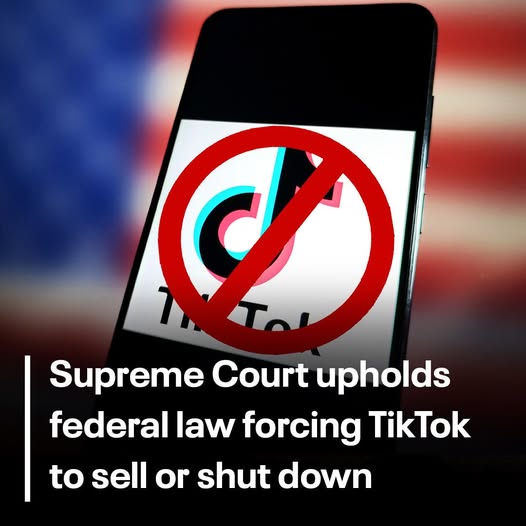In a landmark decision on January 17, 2025, the U.S. Supreme Court unanimously upheld a federal law mandating the divestiture of TikTok from its Chinese parent company, ByteDance, citing national security concerns. This ruling requires TikTok to sever ties with ByteDance by January 19, 2025, or face a nationwide ban.
Background of the Ban
The controversy surrounding TikTok centers on fears that the Chinese government could access sensitive data collected from American users, potentially compromising national security. In response, Congress passed legislation in April 2024, signed by President Joe Biden, necessitating ByteDance to sell its U.S. operations of TikTok within 270 days. Failure to do so would result in prohibiting app stores from offering TikTok and barring hosting services from supporting it.
Supreme Court’s Rationale
The Supreme Court’s 27-page ruling emphasized that while TikTok serves as a significant platform for expression for over 170 million Americans, the national security risks associated with its data collection practices and foreign ownership cannot be overlooked. The Court stated, “Congress has determined that divestiture is necessary to address its well-supported national security concerns regarding TikTok’s data collection practices and relationship with a foreign adversary.” The justices concluded that the law does not infringe upon First Amendment rights.
Implications for TikTok Users
With the ban set to take effect on January 19, 2025, TikTok has announced plans to shut down its platform in the U.S. by the deadline if a divestiture does not occur. This shutdown would prevent users from accessing the app, leading to significant disruptions for content creators and businesses that rely on the platform for engagement and revenue.
Political Developments
As the enforcement date approaches, President Joe Biden has indicated he will not implement the ban before leaving office on January 20, 2025, leaving the decision to President-elect Donald Trump. Trump has expressed interest in exploring options to preserve the app, suggesting a potential delay in enforcement or seeking alternative solutions to address security concerns without a complete ban.
Legal and Social Reactions
The Supreme Court’s decision has sparked debates among digital rights advocates and TikTok users. Critics argue that the ban suppresses free speech and sets a concerning precedent for government control over digital platforms. Supporters contend that the move is necessary to protect national security interests. The ruling also raises questions about the future of other foreign-owned apps and the criteria used to assess security threats.
Future Prospects
As the situation unfolds, ByteDance faces the challenge of finding a U.S.-based buyer to comply with the divestiture requirement. Potential buyers have expressed interest, but negotiations are complex, involving valuation disputes and regulatory approvals. The outcome will significantly impact the digital landscape, influencing how foreign-owned applications operate within the United States and how national security concerns are balanced with technological innovation and user rights.

